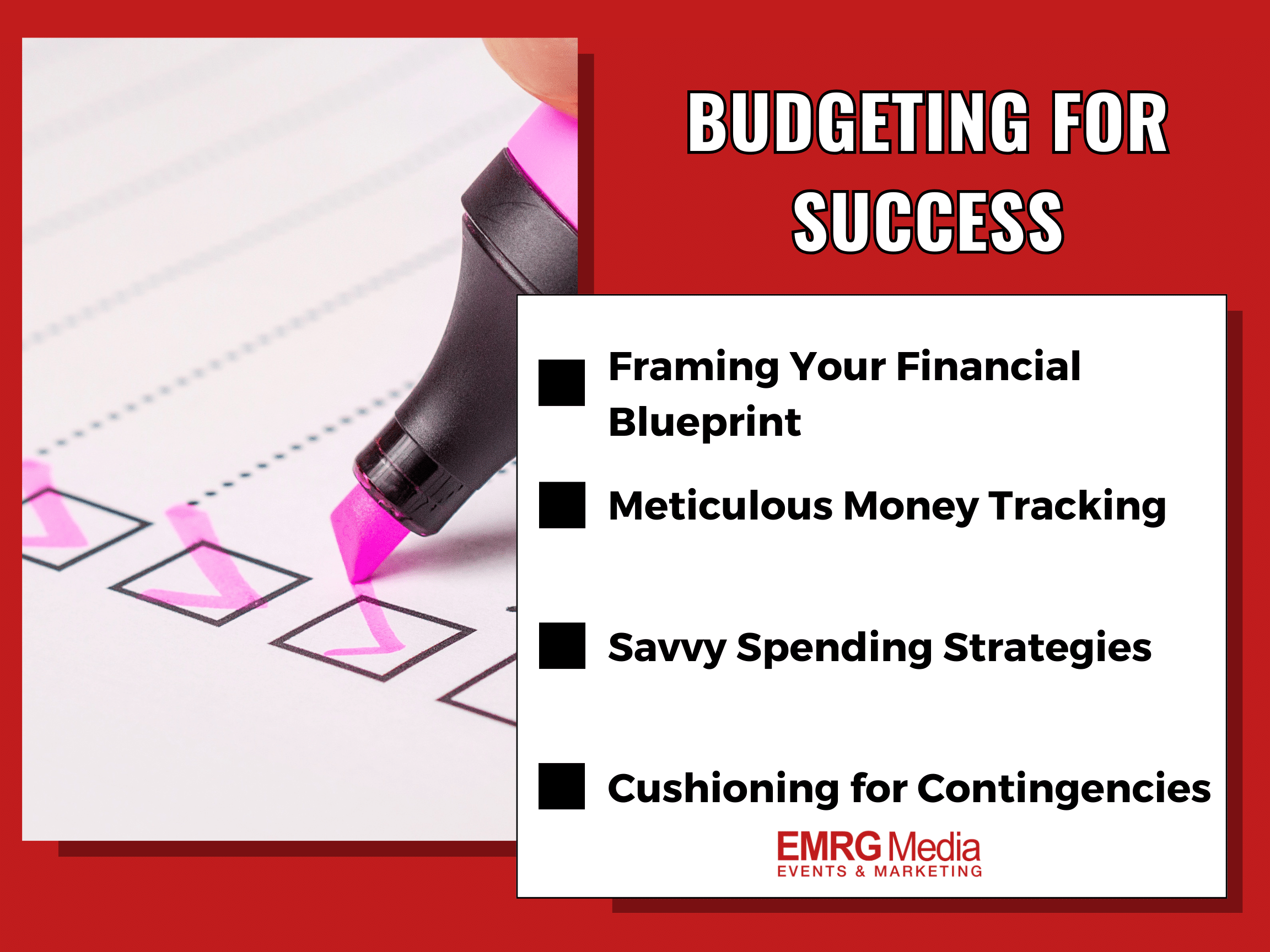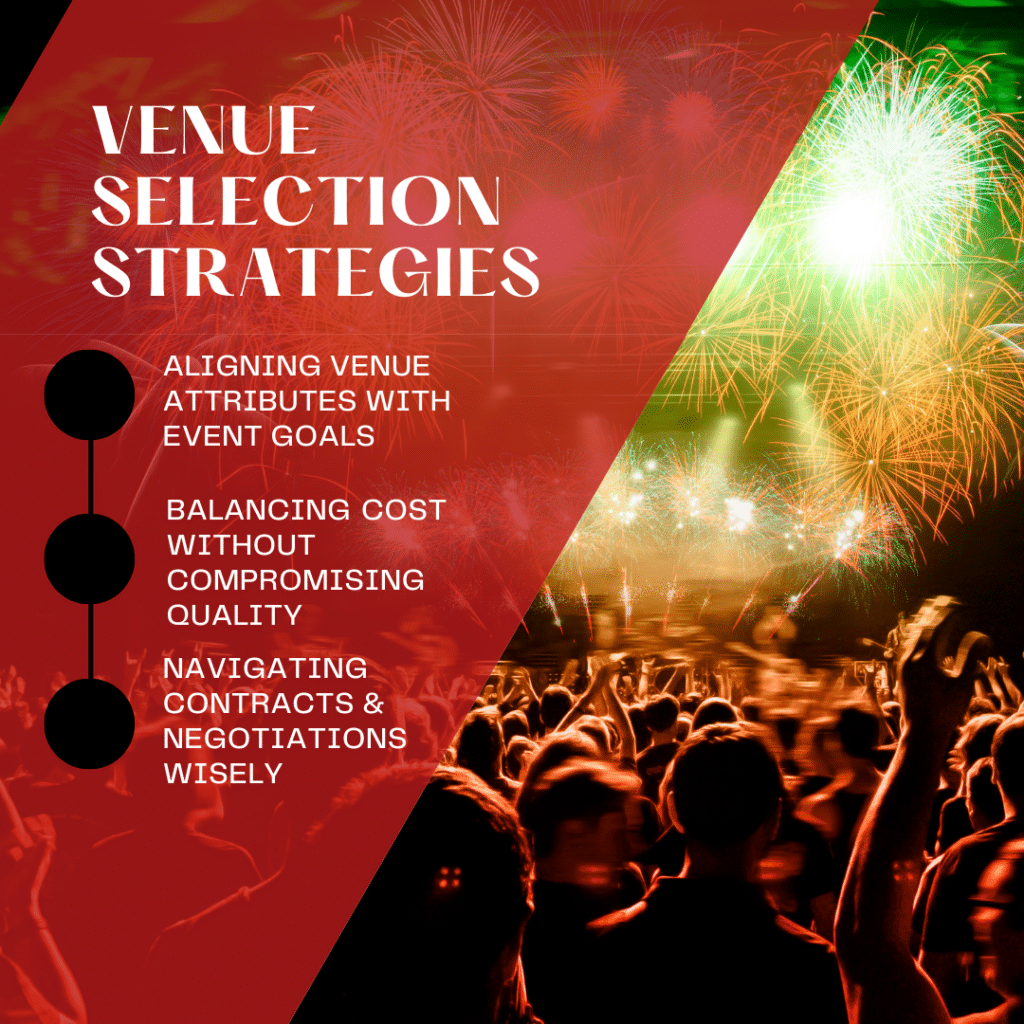This event planning checklist guide is your key to organizing a fantastic event, just like the pros at EMRG Media do! You’ll learn to set solid foundations with clear goals, manage your budget wisely, and nail down all those crucial deadlines.
EMRG Media is the team to call if you want your event to shine. They’re masters at putting together events that people remember, thanks to their long history of success in New York City. And now, they’re giving away their tips with a detailed event planning checklist.
From choosing the perfect venue that resonates with your vision to securing top-notch vendors who’ll bring it all together—you’ve got it covered here.
Plus, get insider tips on event marketing that fills seats and strategies for attendee management that make every guest feel VIP.
And when the big day arrives? You’ll be ready to deliver an unforgettable experience without breaking a sweat.
Ready to turn your event vision into a reality? Contact EMRG Media and let our team of experts guide you through a seamless and unforgettable event planning experience in New York City.
Table Of Contents:
- Crafting Your Event’s Vision and Objectives
- Budgeting for Success
- Mastering the Timeline
- Venue Selection Strategies
- Engaging Vendors and Suppliers
- Marketing and Promotion Tactics
- Registration and Attendee Management
- Ensuring Event Day Excellence
- FAQs about Event Planning Checklist
- Concluding Thoughts: Mastering the Ultimate Event Planning Checklist for Flawless Gatherings
Crafting Your Event’s Vision and Objectives
When planning an event, start by deciding what you want it to be about. Ask yourself: What should guests remember after they leave?
It’s more than just choosing a theme – it’s like telling a story that your event will bring to life from start to finish.
Setting Your Sights
Think of your main goal as a guiding light, helping you choose where to hold the event and what food to serve. Picture this: for a charity gala, your aim might be “Inspiring Generosity.”
Each part of the event should bring this idea to life, inspiring guests to give and deeply connect with the cause.
Think about what feelings or responses you want to create. Is it excitement for a product launch? Networking opportunities at a conference?
Objectives That Measure Up
Let’s discuss setting goals with clear targets. A goal without specific numbers is like a ship sailing without a map; you might be moving, but where are you going?
If ‘increasing brand awareness’ is on your agenda, set a clear goal for how many times you’d like your brand mentioned on social media.
This will help you measure the success of your efforts. Concrete objectives make all the difference when gauging post-event triumphs.
If fundraising is part of your main goals, setting specific financial targets can help to guide your planning. Consider what you’ve raised before or typical amounts for similar events to set a realistic target.
Making It Measurable
Linking your goals to outcomes that you can measure turns hopes into something concrete.
Use attendee feedback surveys or social engagement analytics post-event; these tools offer insights that tell whether those lofty goals were met or exceeded.
This way, not only do we get tangible proof of success, but we align our strategies more precisely for future events.
Budgeting for Success
Creating a comprehensive budget is the backbone of any successful event. With EMRG Media’s expertise, you’ll learn to track expenses meticulously and allocate funds effectively.
 Framing Your Financial Blueprint
Framing Your Financial Blueprint
First up, start with an outline that captures all potential costs. Think venue, catering, marketing, and any logistics.
A solid financial plan begins with knowing where each dollar could go.
To clarify your budgets, categorize your costs into fixed (like venue rent) and variable (such as attendee-driven catering expenses). By doing this, you can identify areas with flexibility and must-haves.
Meticulous Money Tracking
Once your budget takes shape, tracking tools are essential. Think of spreadsheets or specialized event management software that makes life easier by keeping tabs on real-time spending.
Regular review of budgets ensures no surprise expenses. Keeping a close eye on your budget helps prevent money issues that could affect everything, from the decorations to the menu.
Tools like QuickBooks and vigilant oversight can help maintain control without cutting corners on quality or experience.
Savvy Spending Strategies
The trick isn’t just staying within limits—making intelligent choices that maximize impact per dollar spent.
Spending more on reliable vendors at the start can save you money by reducing the risk of problems during your event.
Good negotiation skills are important. They help you get better prices without sacrificing quality, making your budget go further and creating an event that people will remember and talk about long after it’s over.
Cushioning for Contingencies
Even well-planned events face unexpected challenges—a sudden weather shift or last-minute vendor cancellation won’t wait for anyone.
So be prepared. Set aside a portion of your budget for these ‘just-in-case’ moments.
Doing so safeguards against scrambling when things don’t go exactly according to your event planning checklist.
Mastering the Timeline
Creating a timeline for your event planning checklist is like building a roadmap: it guides you from start to finish, helping you stay on track and avoid any bumps.
A well-constructed timeline is not just about setting dates; it’s about pacing your planning process to ensure every detail gets attention.
Determining Key Milestones
The first step in mastering your event’s timeline is pinpointing key milestones. Think of these as checkpoints that keep everything moving forward.
They’re the critical tasks that need extra focus, such as finalizing the venue or confirming significant vendors.
Establish clear deadlines for each milestone and work backward from your event date to set them into motion at strategic intervals.
This approach allows breathing room between significant steps, giving you time to assess progress and adjust if needed.
Remember that having a flexible approach within your planned framework can reduce stress and help ensure you don’t miss any details.
Allocating Time Wisely
Savvy planners know that some tasks take longer than others—securing special permits or custom-building props can’t be rushed.
That’s why allocating time wisely across different planning phases is essential for maintaining momentum without sacrificing quality.
Plan for extra time on big tasks but mix in easy ones to keep things balanced; this way, you have a good flow of major and minor achievements that help everyone stay motivated.
Incorporating Buffer Periods
No matter how perfect an event plan might seem on paper, real life often has other ideas—a vendor falls through at the last minute, or weather forces change in logistics.
Include extra time in your schedule as a safety net; it gives you room to handle any unexpected issues without throwing off your entire plan.
To effectively use buffers, anticipate potential delays by looking at past events’ challenges by learning from history, which helps predict future obstacles, and prepare contingency plans accordingly so when surprises arise, they become mere speedbumps rather than roadblocks on your path toward success.
Venue Selection Strategies
Finding the right venue is like setting up a chessboard for success; each piece must be strategically placed. Matching your event with a location that echoes its purpose and essence is crucial.
 Aligning Venue Attributes with Event Goals
Aligning Venue Attributes with Event Goals
First, think about what you want your event to say. Is it formality or fun? Innovation or tradition?
Look at places that reflect your event’s theme and can accommodate its unique space, technology, and service requirements.
Don’t forget accessibility—your guests will thank you for choosing a venue that’s easy to get to, whether by public transport or car parking options nearby.
And remember, ambiance, lighting, acoustics, and even the scent of a place can make all the difference in crafting memorable experiences.
Balancing Cost Without Compromising Quality
Your budget will play lead guitar when selecting venues—but don’t let cost cut corners on quality.
List potential hidden fees like cancellation policies or minimum food and beverage spending before signing contracts to avoid this pitfall without overspending.
Always ask if there are package deals available that could bundle together essentials at lower rates than if sourced separately.
Navigating Contracts & Negotiations Wisely
A solid contract is your safety net, so dive into details headfirst. Check deposit details, final payment due dates, and liability insurance requirements. These protect both parties involved in case plans go wrong.
You have room to negotiate better prices, especially if you’re bringing sizeable business during off-peak times or planning multiple events with one venue over time.
Engaging Vendors and Suppliers
Finding the right event planners is like assembling a championship sports team; each player must be at the top of their game.
In New York City, where options abound, selecting vendors and suppliers who align with your event’s vision can make all the difference.
Identifying Top-Tier Partners
The quest for quality begins by researching potential vendors’ reputations and reliability. Seeking out those with glowing reviews on platforms such as Yelp or industry-specific sites gives you insight into their performance under pressure.
Networking within professional circles often leads to recommendations worth their weight in gold.
A stellar vendor doesn’t just bring expertise but also meshes well with your team’s dynamic.
Meeting face-to-face or via video calls allows both parties to gauge compatibility before making commitments.
Negotiating Terms That Work For Both Sides
After picking your top choices, it’s time to get down to business. Discussing contract details early on helps avoid unexpected issues later.
Discuss deliverables, timelines, and payment schedules to ensure mutual understanding.
Remember that negotiation is a two-way street; being fair will foster goodwill and dedication from your chosen suppliers.
Cultivating Relationships Beyond The Event Horizon
Aim for ongoing relationships instead of one-time deals. Long-term partnerships are more valuable than single events.
Keeping communication channels open even after an event concludes lays the groundwork for future collaborations.
Recognizing outstanding work through shoutouts on social media posts or testimonial blog posts boosts morale and can solidify bonds between businesses.
Maintaining regular check-ins during quieter times may reveal new opportunities or services they offer, which could unexpectedly elevate upcoming events.
Marketing and Promotion Tactics
A successful event is like making a hit movie; it needs planning and an audience to enjoy it.
In the busy streets of New York City, which EMRG Media calls home, making your event stand out requires more than word-of-mouth. Let’s explore how to draw in the crowds with strategies that stick.
Traditional Advertising: A Fresh Take
Traditional ads still make an impact. Picture the bold billboards in Times Square or engaging subway ads—they stand out as a part of the city’s landscape.
To give these tried-and-true methods new life, tailor them to speak directly to your target demographic by highlighting what sets your event apart.
Pair these efforts with strategic partnerships and local event sponsorships to get more bang for your buck, which can amplify reach without breaking the bank.
Social Media Campaigns: The Art of Engagement
Social media is a powerhouse for marketing today. But don’t just promote your event; build an engaging online experience that starts well before the event begins.
Use platforms like Instagram or Facebook not only to announce but also to tease elements of what attendees can expect through behind-the-scenes looks or speaker highlights.
A good social media plan isn’t just about posting; it’s also about listening to and engaging with your potential audience.
Building Excitement Through Engagement Techniques
The key is to engage your audience, turning them from the audience into active participants who can’t wait for the event to start.
Consider hosting pre-event webinars discussing industry trends related to your event theme or running contests encouraging user-generated content tied back to their excitement about attending.
Everyone loves like they’re already part of something special before stepping inside.
Weave analytics tools into each platform you use to track success along this journey and adjust tactics accordingly so you’ll know exactly what works best for engaging future audiences.
Registration and Attendee Management
A smooth event registration process sets the tone for a great experience.
Finding the Right Registration System
The core of online registration and final registration numbers management hinges on selecting a sturdy registration system.
This system should be user-friendly, offering attendees a straightforward online registration process while giving you real-time data to keep track of registration numbers.
Consider features such as customizable registration forms that efficiently gather all requisite information without overwhelming participants.
An adequate system simplifies check-in, minimizes wait times, and guarantees positive initial impressions.
Explore options that provide mobile capabilities, enabling your staff to oversee entries remotely from any location within your venue.
Streamlining Check-In Procedures
Gone are the days of long lines and paper lists at event entrances. Today’s event technology lets us welcome guests with quick scans of QR codes or NFC-enabled devices. Such tools speed up entry and reduce errors.
Incorporating self-service kiosks where attendees can print badges and agendas upon arrival is another way to let them immediately take control of their experience.
Ensuring Seamless Experience Post-Event
A memorable event doesn’t end when lights go out; it extends through how you wrap things up with your attendees.
Sending personalized thank-you emails or surveys via platforms like SurveyMonkey allows you to gather feedback efficiently while keeping engagement high even after they’ve left.
This step shows appreciation and provides invaluable insights into what worked well and what could use some tweaking next time — vital info if repeat events are part of your strategy.
Ensuring Event Day Excellence
The day of your event is showtime, and all eyes are on execution. Let’s zero in on staff coordination, contingency planning, and logistical management to ensure everything unfolds without a hitch.
Staff Coordination
Your team needs to be a well-oiled machine. Start by assigning clear roles and responsibilities to ensure everyone knows their part.
Next is communication with each member with tools like walkie-talkies or headsets that keep the lines open, ensuring swift action when needed.
Last but not least is the briefing session before doors open. It’s vital to align your team with the day’s flow and address any last-minute event details.
Contingency Plans
No matter how well you plan, unexpected things can happen. Ensure backup plans are ready for bad weather or technical issues.
For instance, if an outdoor event faces rain forecasts, have a nearby indoor space on standby or marquees at the ready.
Remember that vendors might fall through or deliver late—you should always have alternatives lined up just in case.
On-the-Day Logistics Management
This involves overseeing every moving part—from setup times to managing traffic flow within the venue itself.
Make sure signage guides attendees seamlessly throughout spaces, which helps avoid bottlenecks.
Beyond space planning, consider time, too—add breaks between sessions so guests can unwind and move to the next part without hurrying.
If issues arise despite all precautions, stay calm and troubleshoot quickly because cool heads prevail under pressure.
Combine these details, and you’ll have an event that seems seamless yet makes a lasting impression, giving your guests memories to share long after it ends.
FAQs about Event Planning Checklist
What are the 5 P’s of event planning?
The 5 P’s stand for Proper Planning Prevents Poor Performance. They’re your roadmap to nailing an event.
What should be on an event checklist?
Your checklist needs dates, tasks, team roles, and deadlines. Think logistics, marketing, vendors—the works.
What are the 7 stages of event planning?
Dream it up; pen out a plan; get your budget straight; book that spot; rally a crew; spread the word; run showtime smoothly.
What are the 5 W’s in event planning?
Cover Who’s coming, What’s happening, When it unfolds, Where it kicks off and Why you’re hosting—clarity is king.
Concluding Thoughts: Mastering the Ultimate Event Planning Checklist for Flawless Gatherings
Always keep your event’s vision in mind. Your event planning checklist should begin with well-defined goals, serving as the driving force behind every decision you make.
Budgeting wisely is crucial, striking a balance between your aspirations and financial resources to ensure that every cent contributes to a remarkable outcome.
A well-planned timeline is essential, covering every aspect from early preparations to the final cheers, effectively keeping stress at bay and paving the way for a successful event.
The choice of venue and vendors goes beyond mere decisions; they are your partners in crafting meaningful moments, and now you possess the knowledge to select them wisely.
Passionate promotion is key, as an empty room is just space, but effective marketing transforms it into a vibrant gathering, drawing enthusiastic crowds to your creation.
Meticulous attendee management isn’t just necessary; it’s an integral part of the magic, turning attendees into advocates for your brand’s story.
As the event day approaches, celebrate confidently, knowing that this event planning checklist has been your trusted roadmap to excellence. A flawless execution awaits, and you are well-prepared to make it a reality!
Embark on a journey of flawless event planning with EMRG Media. Contact us today to start crafting your next extraordinary event in NYC. Let EMRG Media create your next unforgettable experience.


 Framing Your Financial Blueprint
Framing Your Financial Blueprint Aligning Venue Attributes with Event Goals
Aligning Venue Attributes with Event Goals

